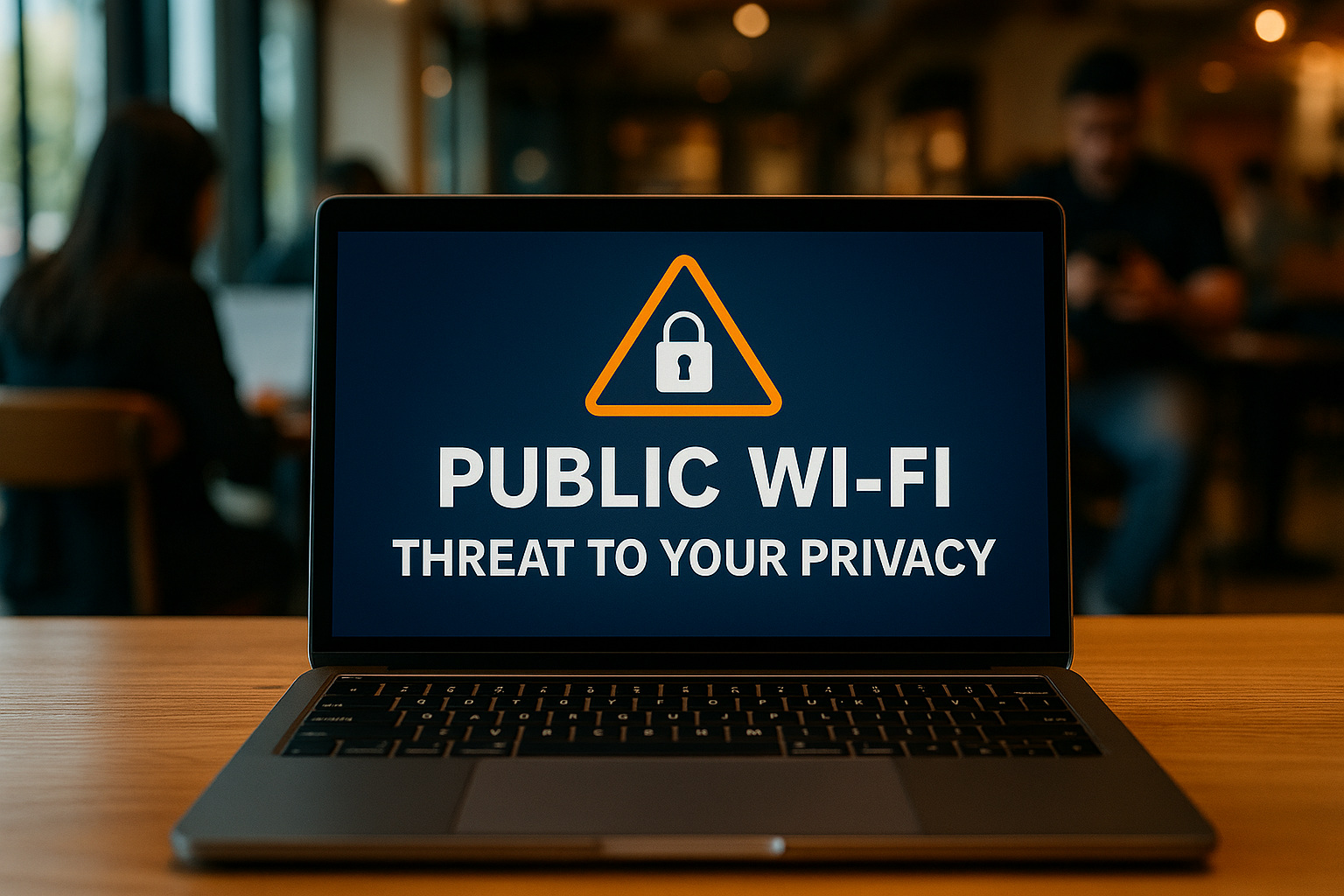Public computers and Wi-Fi hotspots are convenient—but they can be dangerous. Whether you’re in a library, hotel, internet café, or airport, using shared networks and devices puts your personal data at serious risk.
Even quick online tasks like checking email or printing a document can leave you exposed to cyberattacks or data theft if you’re not careful.
Here’s how public digital spaces compromise your privacy—and how to protect yourself when using them.
What Are Public Computers and Networks?
Public computers are devices provided for shared use in places like schools, hotels, or libraries. They’re accessed by multiple people throughout the day.
Public Wi-Fi refers to any open wireless network—usually found in coffee shops, airports, malls, and similar spaces.
These systems often lack personal user accounts, encryption, or protections against tampering.
Without proper security, anything you do or type may be visible to someone else on the same system or network.
The Hidden Dangers of Public Computers
Public devices are outside your control—you don’t know who used them before you, or what they may have installed.
Here are some of the biggest risks:
1. Keyloggers:
Malicious software that records everything you type—including passwords, emails, and messages.
2. Malware:
Public computers may be infected with viruses that steal data or install backdoors for hackers.
3. Caching:
Browsers often store temporary files, cookies, and saved credentials—even after you close the window.
4. Unauthorized Monitoring:
Some systems may be monitored or configured to capture screenshots or activity logs.
Using these devices for anything sensitive puts your data directly in harm’s way.
The Risks of Public Wi-Fi
Wi-Fi hotspots often have no encryption, which means other users on the same network can intercept your traffic.
Here’s what can happen:
- Hackers use “packet sniffers” to read your internet activity
- Fake hotspots mimic real ones, tricking you into connecting
- DNS hijacking can redirect you to fake websites
- Man-in-the-middle attacks let attackers modify what you see or send
Even HTTPS websites aren’t always foolproof—especially if a network is tampered with.
What Not to Do on Public Computers
Avoid these activities on public devices:
- Online banking or mobile wallet logins
- Shopping with saved credit cards
- Accessing personal email or work accounts
- Saving passwords in browsers
- Entering sensitive data (like your SSN or ID number)
Even logging into social media can give attackers a path into your online identity.
Keep your session short, and limit it to basic browsing or printing.
What Not to Do on Public Wi-Fi
If you’re using public Wi-Fi, avoid:
- Logging into accounts without 2FA
- Making payments or purchases
- Accessing company systems or private documents
- Sending private messages with personal info
- Opening sensitive files from cloud services
Public Wi-Fi should be treated as insecure by default. Use it for reading the news, watching videos, or general browsing only.
How to Protect Yourself on Public Computers
If you must use a public computer, take these steps:
1. Use Incognito Mode:
Private browsing reduces the data saved on the machine.
2. Never Save Passwords:
Decline browser offers to save credentials, and log out of all accounts when finished.
3. Clear Browsing Data:
Manually delete cookies, cache, and history before closing the browser.
4. Watch for Suspicious Behavior:
If the computer runs slowly, shows strange pop-ups, or has restricted settings, avoid using it.
5. Avoid Plugging In Devices:
Don’t connect USB drives or phones—malware could jump to your personal hardware.
How to Stay Safe on Public Wi-Fi
To use public Wi-Fi safely:
1. Use a VPN:
A Virtual Private Network encrypts your traffic, hiding it from others on the network.
2. Connect Manually:
Avoid networks that auto-connect. Choose the correct network name and confirm it with staff.
3. Use HTTPS:
Stick to sites with HTTPS encryption—look for the lock icon in the address bar.
4. Turn Off Sharing:
Disable file and printer sharing in your system settings while on public networks.
5. Log Out Fully:
Don’t just close the browser—log out of all accounts before disconnecting.
Be Wary of Fake Hotspots
Hackers create fake Wi-Fi networks with names like “Free_Public_WiFi” to trick users.
Once connected, they can:
- Intercept logins
- Redirect you to malicious websites
- Collect any data you send
Always verify the network name with a trusted source. If you’re unsure, use your mobile data instead.
Keep Devices and Software Updated
Using outdated systems increases your risk. If you bring your own device to public networks:
- Install OS updates
- Update antivirus software
- Use browser extensions that enforce HTTPS (like HTTPS Everywhere)
Your device is your responsibility—don’t assume public spaces will protect it.
Use Multi-Factor Authentication (2FA)
Enable 2FA on all major accounts. Even if your password is stolen, a second step can stop the attack.
Authentication apps are safer than SMS and work even if you lose the network connection.
This one step can protect your entire online identity from public Wi-Fi threats.
Consider a Personal Hotspot
If you frequently need internet on the go, use your phone’s mobile hotspot feature.
Cellular connections are encrypted by default and much safer than public Wi-Fi.
Make sure to set a strong password on your hotspot to prevent freeloaders or attackers nearby.
Don’t Assume Privacy in Public Spaces
Even beyond technology, remember that public computers may be in view of others.
Avoid opening personal photos, messages, or documents in visible locations.
Use screen privacy filters if needed—and never leave the device unattended while logged in.
Final Thoughts: Convenience Shouldn’t Cost Your Privacy
Public devices and networks offer convenience—but at a serious cost if you’re not careful.
Use them only when necessary. Stay alert. Limit what you access. And always take steps to protect your data.
Your personal information is valuable—don’t let public spaces turn it into a free-for-all.

With over two decades of experience in the tech world, the author of Promoção InternetFibra is passionate about helping people improve their home internet. He specializes in networks, equipment, and performance optimization, turning complex tech topics into simple, practical advice. His mission is to make reliable, high-speed internet accessible for everyone.
